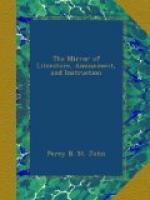The isolated basaltic rocks in the centre of the valley may give rise to some curious speculations on the origin of this island. It has long been decided that basaltic rocks are of igneous origin, in opposition to the theory of Werner—that they were deposited by the ocean on the summits of elevated mountains. May not the occurrence of these basalt rocks therefore illustrate the more immediate volcanic origin of Tucopia?
The second Cut represents the Piercy islands, two barren islets situated a short distance off Cape Bret, (New Zealand,) near the entrance of the Bay of Islands: one is of very small size, and appears connected to the other by a ledge of rocks visible at low water. The larger one is quoin shaped, and has a remarkable perforation, seen in the sketch.
[1] Member of the Royal College of Surgeons in London, &c.
[2] United Service Journal, Jan. 1832.
[3] I did not observe them
take the trouble of wrapping up the
ingredients
together, as is customary in India; but some would
eat
the betel leaf, previously dipping it in some lime
(made
from
burnt coral) which he held in his hand, and ate the
areka-nut
afterwards; they had no tobacco to eat with it, nor
did
I hear them inquire for any.
* * * * *
OLIVER GOLDSMITH.
(For the Mirror.)
One of the residences of this historian and poet, was about a mile from Paddington on the north side of the Edgware Road, near a place called Kilburn Priory; and the wooden cottage is still standing, although the land near it has been of late covered with newly-erected villas. It is occupied by a person in humble life, and is not to be altered or removed owing to the respect entertained for the memory of this remarkable literary character. In this cottage, Goldsmith wrote his admirable treatise on Animated Nature. A sketch of this rustic dwelling is a desideratum, as, in after days, it may be demolished to make way for modern improvement.
J.C.H.
* * * * *
STANZAS
To the spirit of evening.
(For the Mirror.)
Mild genius of the silent eve!
Thy pathway through the radiant
skies,
Is the rich track which sunbeams weave
With all their varied, mingling,
dyes,
Ere yet the lingering sun has fled,
Or glory left the mountain’s head.
Yet not one ray of sunset’s hue
Illumes thy silent, peaceful
train;
And scarce a murmur trembles through
The woods, to hail thy gentle
reign,
Save where the nightingale, afar,
Sings wildly to thy lonely star.
Yet gentlest eve, attending thee,
Come meek devotion, peace,
and rest,
Mild contemplation, memory,
And silence with her sway
so blest;
And every mortal wish and thought,
By thee to holiest peace is wrought.




